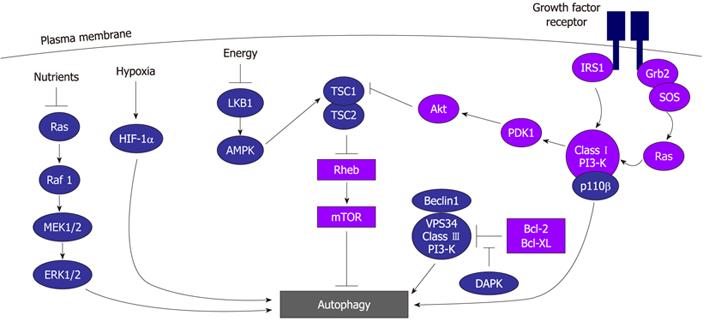Copyright
©2012 Baishideng Publishing Group Co.
Figure 2 The regulation of autophagy.
Autophagy is regulated by multiple signaling pathways. In response to growth factors, mTOR is activated by the class I PI3-K and Akt, which inhibits tuberous sclerosis protein (TSC)1/TSC2. The activation of this cascade leads to the inhibition of autophagy. mTOR activity is inhibited by AMPK, a kinase activated in response to elevated intracellular AMP/ATP ratio. In addition, the p110-β catalytic subunit of the class I PI3-K can directly stimulate autophagy during starvation, independently of Akt activation, through its association with the class III PI3-K complex. The growth-factor-mediated activation of Ras induces antagonistic effects on autophagy depending on its downstream target, while the activation of the class I PI3-K cascade represses autophagy, and the stimulation of the Raf-1-MEK1/2-ERK1/2 signaling cascade in response to amino acid depletion promotes autophagy. Hypoxia induces autophagy via activation of hypoxia-inducible factor 1α. Finally, autophagy is also regulated by death-associated protein kinase, which promotes the initiation of autophagy through the release of Beclin 1 from the Bcl-2/Bcl-XL complex. The DAPk-related protein kinase 1 has also been found to be necessary for the induction of autophagy.
- Citation: Abounit K, Scarabelli TM, McCauley RB. Autophagy in mammalian cells. World J Biol Chem 2012; 3(1): 1-6
- URL: https://www.wjgnet.com/1949-8454/full/v3/i1/1.htm
- DOI: https://dx.doi.org/10.4331/wjbc.v3.i1.1









